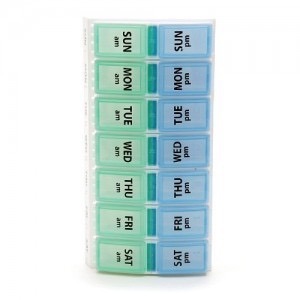Many people are prescribed medication at some point in their lives
It may be for various health conditions, such as anxiety, ADHD, or depression. It could also target other things like allergies, infection, cholesterol, or high blood pressure. Even though it is very important to always take the medication as prescribed, most people do not do so. In fact, the CDC estimates that 50% of people are not compliant with medications.
The findings are even more concerning for mental healthcare needs

In fact, 80-90% of adults who are prescribed medication for ADHD do not take ADHD medication regularly, even though medications are prescribed daily on a long-term basis. Similarly, 50-75% of adults are non-compliant with antidepressant medications. The research by the CDC directly linked non-adherence to medication to 50% of treatment failure, and up to 125,000 deaths annually. That’s a life every 4 minutes.
In summary, not taking medication as prescribed is common, a big deal, and it’s dangerous
Why do people stop taking medications or fail to take them as directed?
They forget
Most people have good intentions, but stop taking medication once they feel better. Often, they simply don’t get into the habit of taking them daily. This is particularly true for antidepressants and ADHD medications.
Long-term habits are challenging
Even other habits, like exercising, eating our vegetables, and going to bed on-time are tough for people to commit to. People in general have a hard time with long-term tasks that they find mundane or boring. It can be even more difficult if they have insurance that is difficult to work with, requires the person to use only certain pharmacies or mail order services, or doesn’t provide much financial coverage for prescriptions.
Sometimes “stress thoughts” take over
Some common thoughts or fears about medications are listed below. It is important that if you have these thoughts, you tell someone you trust. Hopefully, that person is your medication provider and you can sort through these thoughts and feelings together.
Common stress thoughts include:
- “I’m embarrassed about taking medication.”
- “I’ll never be able to ‘get off’ the medication.”
- “I don’t need this anymore.”
- “These are too expensive.”
- “I don’t feel like taking this today.”
- “I’m too busy to follow through on this. It’s just one more thing I have to do.”
- “It doesn’t help anyway.”
- “This will change my personality or change who I am.”
- “This is just too hard to do.”
How Can You Help Your Compliance (And Your Medications to Work Better)?
Here are some suggestions that may help. While many of them sound easy, they are not. But, for your own safety and your own treatment success, it is important to try. It will take commitment from you, as well as practice until you find a strategy to work for you.
Remember why you are taking the medication
Write it down if necessary, and put a copy with your medication bottle or pill keeper. If it was worth visiting your physician about your health condition, it is probably worth it to follow her advice. Write down what aspects of your health condition are most difficult, and remind yourself you don’t want to feel this way anymore.
For example, you may write down something like this. “I am taking this medication for depression. I don’t want to feel so sad, tired, and irritable anymore. I want my relationships to be better.” Another example may be, “I am taking this medication for my allergies. I don’t want to be so tired and congested all the time. I want to breathe better.” Then, if you doubt how much you need to take the medicine later, you will remember.
Get a pill keeper, and use it
This is particularly important if you have more than one medication, if you take it more than once daily, or you are rushed or tired at times that you take it.
Pill keepers help compliance. There are many different kinds of examples. (see below). Once a week, usually on Sunday, fill up your pill-keeper. Pill keepers also help you to know when you are running low on medication a week before you run out. This gives you time to call the pharmacy and pick up your medicine BEFORE it is a problem.
Pill keepers help you remember if you’ve taken your medication. You can simply check the day on the box.

Use An Alarm
If you are struggling to stay in the routine, set an alarm. You can use the one on your phone, or you can buy a cheap alarm clock that sits next to your pill keeper. Sometimes, alarm clocks that don’t turn off until you manually turn them off are the best kind, as it will not let you forget.
Address Your Doubts
If you have any of the misgivings about your medication that were listed above (most people do), talk to someone about them. Schedule an appointment with your physician, and talk about your concerns. Your physician will be honest with you, and will understand if you need to hear an explanations a few times. After all, everyone needs verification of why we need to do things from time to time. Some physicians even let you e-mail them brief questions. If you need more help processing the information, it is always ok to seek out a second opinion or talk to your therapist about your thoughts. How you feel about your treatment is VERY important, and plays a big role in getting and STAYING well.
Enlist The Help Of Others
If you have a spouse or loved one who in invested in your health, and would like to see you well, ask for help. “Help” can be as simple as cueing you to use your pill reminder box, or reminding you when they notice that you have not taken your medicine by a certain time during the day. There are even apps, such as Medisafe Medication Reminder, which helps you to not only remember your medication, but can send a text to family members to remind you to take it if you forget. It can be a struggle, but your health is worth it.
![]()
